频度副词always,sometimes,
- 格式:pptx
- 大小:4.32 MB
- 文档页数:16
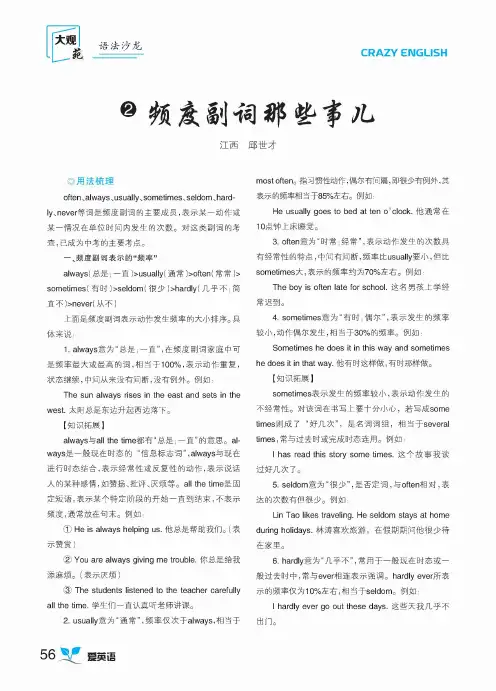
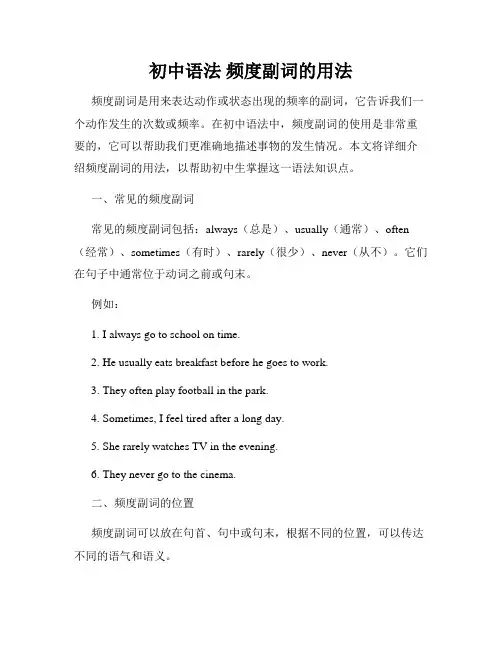
初中语法频度副词的用法频度副词是用来表达动作或状态出现的频率的副词,它告诉我们一个动作发生的次数或频率。
在初中语法中,频度副词的使用是非常重要的,它可以帮助我们更准确地描述事物的发生情况。
本文将详细介绍频度副词的用法,以帮助初中生掌握这一语法知识点。
一、常见的频度副词常见的频度副词包括:always(总是)、usually(通常)、often (经常)、sometimes(有时)、rarely(很少)、never(从不)。
它们在句子中通常位于动词之前或句末。
例如:1. I always go to school on time.2. He usually eats breakfast before he goes to work.3. They often play football in the park.4. Sometimes, I feel tired after a long day.5. She rarely watches TV in the evening.6. They never go to the cinema.二、频度副词的位置频度副词可以放在句首、句中或句末,根据不同的位置,可以传达不同的语气和语义。
1. 句首位置:当频度副词放在句首时,强调的是频度副词本身。
例如:Always, he gets up early in the morning.Usually, she goes to bed at 10 p.m.2. 句中位置:当频度副词放在句中时,通常位于be动词或助动词之后,或者在情态动词之前。
例如:I am always happy to see you.She can usually solve the math problems.They have often traveled to different countries.3. 句末位置:当频度副词放在句末时,强调的是动作本身。
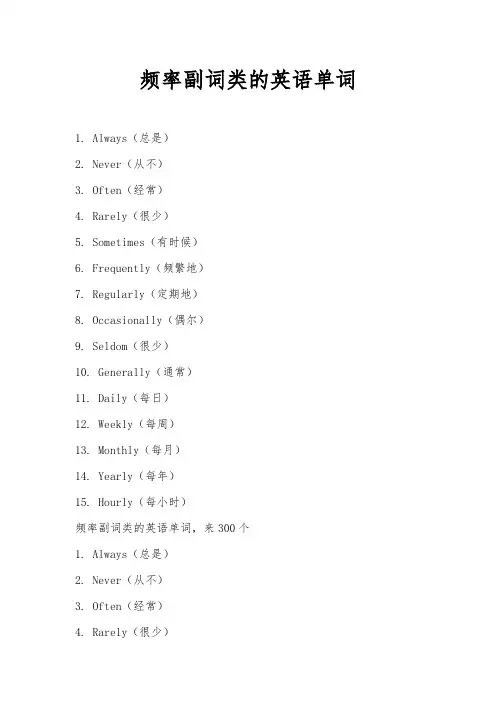
频率副词类的英语单词1. Always(总是)2. Never(从不)3. Often(经常)4. Rarely(很少)5. Sometimes(有时候)6. Frequently(频繁地)7. Regularly(定期地)8. Occasionally(偶尔)9. Seldom(很少)10. Generally(通常)11. Daily(每日)12. Weekly(每周)13. Monthly(每月)14. Yearly(每年)15. Hourly(每小时)频率副词类的英语单词,来300个1. Always(总是)2. Never(从不)3. Often(经常)4. Rarely(很少)5. Sometimes(有时候)6. Frequently(频繁地)7. Regularly(定期地)8. Occasionally(偶尔)9. Seldom(很少)10. Generally(通常)11. Daily(每日)12. Weekly(每周)13. Monthly(每月)14. Yearly(每年)15. Hourly(每小时)16. Annually(每年一次)17. Continuously(不断地)18. Usually(通常)19. Infrequently(不经常地)20. Occasionally(偶尔)21. Consistently(一贯地)22. Once(一次)23. Twice(两次)24. Three times(三次)25. Rarely(很少)26. Hardly ever(几乎从不)27. Every other week(每两周一次)28. Every three months(每三个月一次)29. Every day(每天)30. Every night(每晚)31. Every week(每周)32. Every month(每月)33. Every year(每年)34. Every few days(每隔几天)35. Every other day(每隔一天)36. Every other month(每隔一月)37. Every Tuesday(每周二)38. Every Thursday(每周四)39. Every Saturday(每周六)40. Every other Saturday(每隔一个星期六)41. On weekdays(工作日)42. On weekends(周末)43. Once in a while(偶尔)44. At times(有时候)45. From time to time(偶尔)46. Off and on(断断续续)47. Sporadically(零星地)48. Infrequently(不经常)49. Once or twice a week(一周一两次)50. A few times a year(一年几次)51. Very often(非常经常)52. Uncommonly(不常见)53. Seldomly(很少)54. Never again(再也不)55. Sometimes soon(很快有时)56. Not very often(不常)57. Just once(仅仅一次)58. At hourly intervals(每小时一次)59. Semiannually(半年一次)60. Semiweekly(每周两次)61. Quarter-hourly(每15分钟一次)62. Biennially(两年一次)63. In too large a percentage of cases(在太多的情况下)64. In many cases(在许多情况下)65. Infrequently(不经常)66. In rare cases(在极少数情况下)67. Infrequently(不经常)68. Intermittingly(断断续续)69. Irregularly(不规律地)70. More often than not(多半时候)71. Morning, noon and night(日日夜夜)72. Nightly(每晚)73. Now and then(偶尔)74. Occasionally(偶尔)75. Often enough(经常的)76. Quarter-hourly(每15分钟一次)77. Regular as clockwork(准时正点)78. Regularly timed(定时的)79. Repeatedly(反复地)80. Spasmodic(间歇性地)81. Sporadically(零星地)82. Sometimes(有时候)83. Sometimes sooner, sometimes later(有时更早,有时更迟)84. Sometimes this year(今年有时)85. Sporadically(不定期地)86. Three times a week(每周三次)87. Twice weekly(每周两次)88. Uncertainly(不确定地)89. Unevenly(不平均地)90. Unfrequently(不频繁地)91. Uninterruptedly(不断地)92. Usually, but not always(通常,但不总是)93. Very frequently(非常频繁)94. Weekly(每周)95. Yearly(每年)96. Intermittently(间歇地)97. The whole time(始终)98. The whole year round(全年)99. Less often than not(很少)100. Always and forever(永远)101. Hardly ever(几乎不)102. Annual(每年)103. Constantly(经常)104. Have to(必须,经常)105. Continuously(持续地)106. Every day but Sunday(除了星期天)107. Every night except Monday and Wednesday(除了星期一和三)108. Every other day(每隔一天)109. Every other week(每隔一周)110. Every other month(每隔一个月)111. Every other year(每隔一年)112. Invariably(无论何时都)113. Once a day(每天一次)114. Quite often(相当经常)115. Sporadically(有时)116. Weekly(每周)117. Frequently(时常)118. Intermittently(间歇地)119. Monthly(每月)120. Annually(每年一次)121. Never again(从不再来)122. Often enough(够经常)123. Hourly(每小时)124. Daily but Sunday(除星期天之外的每天)125. Every night but Thursday(除周四之外的每个晚上)126. Every other day(每隔一天)127. Every other week(每隔一周)128. Eevery other month(每隔一个月)129. Every other year(每隔一年)130. Hardly ever(几乎从不)131. Frequently but not always(经常但不总是)132. As much as possible(尽量)133. By and large(总的来说)134. Constantly(不断地)135. Daily(每天)136. Day by day(一天一天)137. Early and often(早早地经常地)138. Every blue moon(不经常)139. Every once in a while(偶尔)140. Every so often(有时)141. From time to time(时常)142. Habitually(习惯地)143. Infrequently(不经常)144. Irregularly(不规律地)145. Moment to moment(一刻不停)146. Most of the time(大部分时间)147. Nightly(夜间每天)148. Now and again(时时有)149. Now and then(有时候)150. Often (times)(经常)151. Occasionally(有时候)152. Once (a day, a week, an hour)(一次(每天,每周,每小时))153. Once in a blue moon(几乎不)154. Once or twice(一两次)155. Onetime(一次性的)156. Periodically(周期性地)157. Rarely ever(几乎从不)158. Regularly scheduled(定期的)159. Repeatedly(反复)160. Routinely(通常)161. Seldom(很少)162. Semi-frequently(有时)163. Sometimes(有时)164. Sometimes sooner, sometimes later(有时早有时晚)165. Sometimes this year(有时这一年)166. Sporadically(偶尔)167. Twice daily(每天两次)168. Twice a week(每周两次)169. Typically(一般来讲)170. Uncommonly(不常见)。
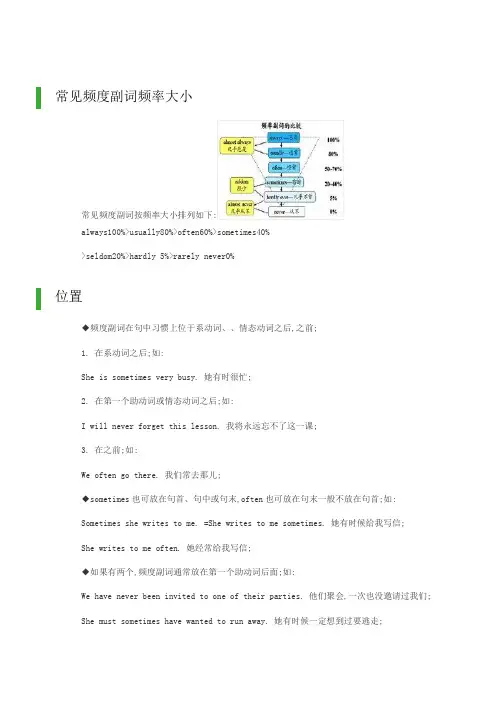
常见频度副词频率大小常见频度副词按频率大小排列如下:always100%>usually80%>often60%>sometimes40%>seldom20%>hardly 5%>rarely never0%位置◆频度副词在句中习惯上位于系动词、、情态动词之后,之前;1. 在系动词之后;如:She is sometimes very busy. 她有时很忙;2. 在第一个助动词或情态动词之后;如:I will never forget this lesson. 我将永远忘不了这一课;3. 在之前;如:We often go there. 我们常去那儿;◆sometimes也可放在句首、句中或句末,often也可放在句末一般不放在句首;如:Sometimes she writes to me. =She writes to me sometimes. 她有时候给我写信;She writes to me often. 她经常给我写信;◆如果有两个,频度副词通常放在第一个助动词后面;如:We have never been invited to one of their parties. 他们聚会,一次也没邀请过我们;She must sometimes have wanted to run away. 她有时候一定想到过要逃走;用法◆always 频率最高,表示动作重复、状态继续,表示"一直、总是",其反义词为never;always 等与not连用时,表示部分否定;如:The rich are not always happy. 有钱的人并不总是快乐的;如果要变为,应将always改为never才能全部否定;如:Li Ping is always late for school. 李平上学总是迟到;Li Ping is never late for school.全部否定Li Ping is not always late for school. 部分否定频度副词通常和连用,表示动作发生的频率;但always与进行时连用时,并不强调动作正在进行,而是表示赞叹、厌烦等情绪;如:He is always thinking of others. 他总是想着别人;赞叹She is always asking silly questions. 她总是问些愚蠢的问题;厌烦◆usually意为"通常",表示习惯性动作或状态,很少有例外;如:We usually go to school at seven in the morning. 我们通常在早上七点上学;My mother and I usually go shopping on Sundays. 我和妈妈通常在星期天去买东西;◆Often意为"经常,时常",表示反复性的动作或状态,中间有间断,不如usually那么频繁;其反义词是seldom;often在句尾时常被very或quite修饰;如:It often rains here in April. 这儿四月份常下雨;The boys often eat noodles and the girls sometimes eat them. 男生经常吃面条,女生有时吃;I often chat with my friends under the big tree. 我经常在这棵大树下和朋友聊天;He writes to his friends quite often. 他常给他的朋友写信;◆sometimes意为"有时",频率不及often,表示动作偶尔发生,间断时间较长;其位置比较灵活,放在句首、句中、句末都可;如:Sometimes we go to the cinema and at other times we go for a walk.有时我们去看电影,有时我们去散步;I sometimes watch TV in the evening. 我有时晚上看电视;My father has lunch in the factory sometimes. 我父亲有时在工厂吃午饭;◆seldom意为"很少";never意为"从不";这两个副词表示否定意义,动作几乎不会发生;如:He seldom eats breakfast. 他很少吃早餐;The little girl seldom goes out. 这个小女孩很少外出;I will never forget your kindness. 我永远忘不了你的好意;The boys never eat chocolate and the girls seldom eat it. 男生从不吃巧克力,女生很少吃;◆hardly具有否定意义,表示"几乎不、简直不",除非特殊情况,否则不会发生;如:The boy is so young that he could hardly understand it. 这个孩子太小了,不可能懂得这件事;◆对上述频度副词提问时,用how often;如:I write to my brother sometimes.→How often do you write to your brother1.为了表示强调,频度副词有时也可位于动词be、助动词、情态动词之前,此时助动词等应重读;如:She always was late. 她老是迟到;I never can remember. 我永远也记不住;2. 在简略答语中,当频度副词与动词be、或情态动词位于句末时,频度副词必须前置;-"Philip is late again." -"Yes, he always is." -"菲利普又迟到了;" -"是的,他总是迟到;"- "Can you park your car near the shops" -"Yes. I usually can."- "你可以在商店附近停车吗"-"是的,通常可以;"在否定句中,有的频度副词位于之前或之后均可,而有的频度副词则必须位于否定词之后,还有的频度副词却必须要位于否定词之前;大致情况如下:1. 频度副词usually和often可位于否定词not之前或之后;他们不常开这样的晚会;正:They don't often hold such parties.正:They often don't hold such parties.星期日我们一般不在9点以前起床;正:We don't usually get up before nine on Sundays.正:We usually don't get up before nine on Sundays.在中,频度副词用于句中或句首,有时但会导致意思不同;He doesn't usually sleep for two days at a time. 他很少一连睡两天;Usually he doesn't sleep for two days at a time. 他连续两天不睡觉是常事;2. 频度副词always总是位于之后,不可位于否定句之前;Things are not always what they seem to be. 外表往往是靠不住的;Silence must not always be read as consent. 沉默并不见得一定意味着同意;3. 频度副词sometimes总是位于之前,不可位于否定词之后;Jim is sometimes not very punctual. 吉姆有时不太准时;Debbie is sometimes not responsible for what she does. 黛比有时对她所做的事不负责任;1.sometimes常可用于句末; 如:We all get into trouble sometimes. 我们有时都会遇到麻烦;You can't work all the time,it does you good to go out and enjoy yourself sometimes.你不能总是工作,有时出去放松一下会对你有好处;2. often有时可置于句末,但通常会带有very, quite, fairly, more, so等;如:We've been there quite often. 经常去那里;When I was young, I used to play tennis very often. 我年轻时经常打网球;Diana used to travel a lot. These days she doesn't go away so often.娜过去经常旅游;这些天她不常出门了;We're not exactly on intimate terms, but we see each other fairly often.虽算不上关系密切,但还常见面;注:有时也可不带,但主要见于或; 如:He writes to me often. 他经常给我写信;Do you come here often 你常来这儿吗I don't come here often. 我不常来这儿;3. usually有时也用于句末,其前不用修饰语;I'm not late, usually. 我通常不迟到;I get paid on Fridays usually. 我通常在星期五领工资;4.seldom 一般不用于句末,除非其前带有only,very等修饰;We go out very seldom. 我们绝少外出;I play basketball very seldom indeed. 我很少打篮球;5. always一般不用于句末,偶尔用于句末,此时它不表法"总是",而表示"永远";I'll love you always. 我将永远爱你;另外,有时用于句末是因为句子有所省略的缘故;Generally they walked together on Sunday, but not always.他们一般在星期日一起散步,但并不总是如此;句中的but not always=but they didn't always walk together on Sunday;1. sometimes常可用于句首;Sometimes she comes late. 有时她来得晚;Sometimes she didn't agree with me. 有时她和我意见不一致;Sometimes we get a lot of rain in August. 有时在8月份雨水很大;2. often用于句首时,通常表示强调,且其前一般有quite, very修饰;Very often he comes in late. 他常常迟到;Quite often the phone rings when I'm in the bath. 电话经常在我洗澡时响;ually有时也用于句首,其前不用修饰语;Usually I get up early. 我平时起得早;Sometimes he comes by bus, but usually he comes by taxi.有时他坐公共汽车来,不过他通常还是打的来;Usually cooking pots have two small handles but pans have one long handle.通常地深底煮锅有两只把手而平底锅只有一个长长的把手;4.always一般不用于句首,除非是用在中;Always remember this. 请时刻记住这一点;Always look in the mirror before starting to drive. 一定要先看看反光镜再开车;另外,never也可用于祈使句的句首;Never tell him the news. 千万不要告诉他这消息;Never ask her about her marriage. 决不要问她结婚的事;5.在正式文体中,表示否定意义的副词seldom, never可位于句首,但此时其后要用;Seldom has there been such a happy meeting. 过去很少有过这样愉快的会议;Never did he think the book would be finished so soon. 他可没想到这本书会这么快看完另外,once a year 每年一次, twice a week 每周两次, three times a day 一天三次, every Saturday afternoon每星期六下午等,这些时间状语也表示频率,它们可以和频度副词用在同一个句子中,表达上没有重复;如:We usually go to the cinema four times a month. 我们通常一个月看四次电影;1、当hardly、never、seldom、rarely作为开头时,句子需要倒装;因为它们表示否定的意义;例:Seldom do I go to work by bus. 我很少乘公共汽车上班;2、hardly、never、seldom、rarely在反意疑问句前一部分时,后一部分应用肯定;例:They seldom come late, do they他们很少迟到,是么。
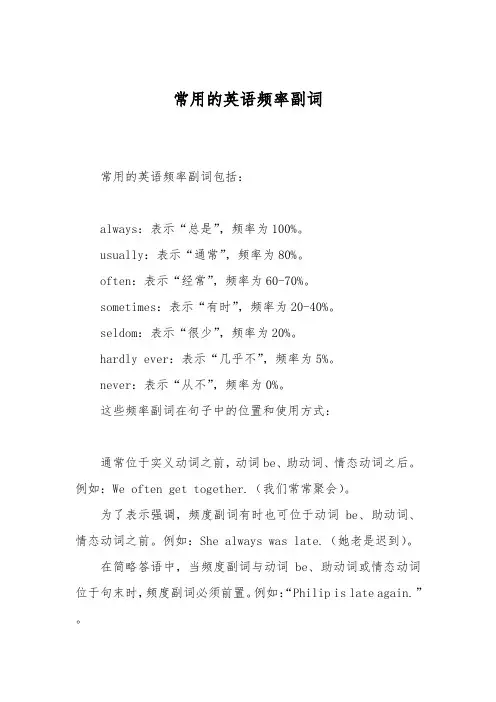
常用的英语频率副词常用的英语频率副词包括:always:表示“总是”,频率为100%。
usually:表示“通常”,频率为80%。
often:表示“经常”,频率为60-70%。
sometimes:表示“有时”,频率为20-40%。
seldom:表示“很少”,频率为20%。
hardly ever:表示“几乎不”,频率为5%。
never:表示“从不”,频率为0%。
这些频率副词在句子中的位置和使用方式:通常位于实义动词之前,动词be、助动词、情态动词之后。
例如:We often get together.(我们常常聚会)。
为了表示强调,频度副词有时也可位于动词be、助动词、情态动词之前。
例如:She always was late.(她老是迟到)。
在简略答语中,当频度副词与动词be、助动词或情态动词位于句末时,频度副词必须前置。
例如:“Philip is late again.”。
频度副词的常见用法和例句:always:表示动作重复、状态继续,如“The rich are not always happy. 有钱的人并不总是快乐的”。
often:表示反复性的动作或状态,如“It often rains here in April. 这儿四月份常下雨”。
sometimes:表示动作偶尔发生,如“Sometimes we go to the cinema and at other times we go for a walk. 有时我们去看电影,有时我们去散步”。
never:表示动作从未发生,如“Li Ping is never late for school. 李平上学从不迟到”。
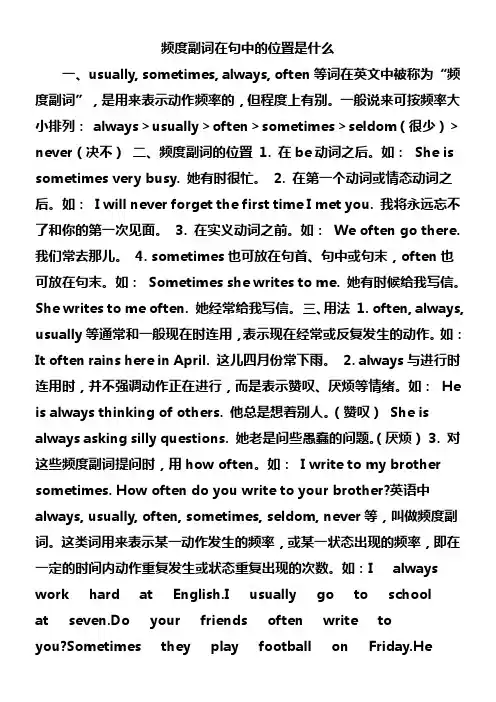
频度副词在句中的位置是什么一、usually, sometimes, always, often等词在英文中被称为“频度副词”,是用来表示动作频率的,但程度上有别。
一般说来可按频率大小排列:always>usually>often>sometimes>seldom(很少)>never(决不)二、频度副词的位置1. 在be动词之后。
如:She is sometimes very busy. 她有时很忙。
2. 在第一个动词或情态动词之后。
如:I will never forget the first time I met you. 我将永远忘不了和你的第一次见面。
3. 在实义动词之前。
如:We often go there. 我们常去那儿。
4. sometimes也可放在句首、句中或句末,often也可放在句末。
如:Sometimes she writes to me. 她有时候给我写信。
She writes to me often. 她经常给我写信。
三、用法1. often, always, usually等通常和一般现在时连用,表示现在经常或反复发生的动作。
如:It often rains here in April. 这儿四月份常下雨。
2. always与进行时连用时,并不强调动作正在进行,而是表示赞叹、厌烦等情绪。
如:He is always thinking of others. 他总是想着别人。
(赞叹)She is always asking silly questions. 她老是问些愚蠢的问题。
(厌烦)3. 对这些频度副词提问时,用how often。
如:I write to my brother sometimes. How often do you write to your brother?英语中always, usually, often, sometimes, seldom, never等,叫做频度副词。
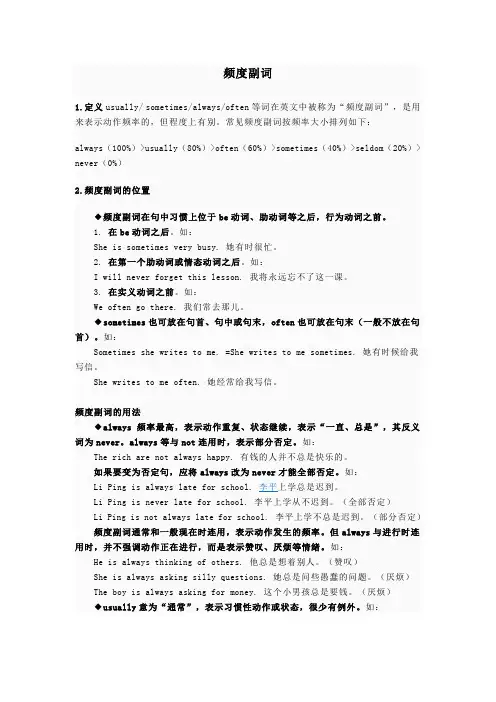
频度副词1.定义usually/ sometimes/always/often等词在英文中被称为“频度副词”,是用来表示动作频率的,但程度上有别。
常见频度副词按频率大小排列如下:always(100%)>usually(80%)>often(60%)>sometimes(40%)>seldom(20%)> never(0%)2.频度副词的位置◆频度副词在句中习惯上位于be动词、助动词等之后,行为动词之前。
1. 在be动词之后。
如:She is sometimes very busy. 她有时很忙。
2. 在第一个助动词或情态动词之后。
如:I will never forget this lesson. 我将永远忘不了这一课。
3. 在实义动词之前。
如:We often go there. 我们常去那儿。
◆sometimes也可放在句首、句中或句末,often也可放在句末(一般不放在句首)。
如:Sometimes she writes to me. =She writes to me sometimes. 她有时候给我写信。
She writes to me often. 她经常给我写信。
频度副词的用法◆always 频率最高,表示动作重复、状态继续,表示“一直、总是”,其反义词为never。
always等与not连用时,表示部分否定。
如:The rich are not always happy. 有钱的人并不总是快乐的。
如果要变为否定句,应将always改为never才能全部否定。
如:Li Ping is always late for school. 李平上学总是迟到。
Li Ping is never late for school. 李平上学从不迟到。
(全部否定)Li Ping is not always late for school. 李平上学不总是迟到。
(部分否定)频度副词通常和一般现在时连用,表示动作发生的频率。
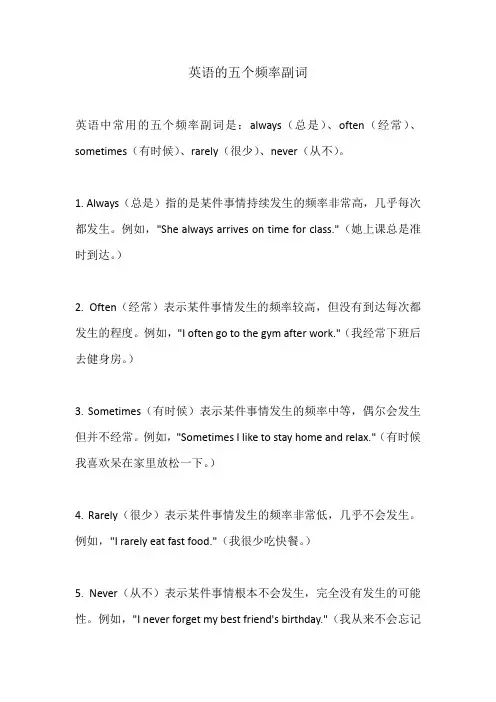
英语的五个频率副词
英语中常用的五个频率副词是:always(总是)、often(经常)、sometimes(有时候)、rarely(很少)、never(从不)。
1. Always(总是)指的是某件事情持续发生的频率非常高,几乎每次都发生。
例如,"She always arrives on time for class."(她上课总是准时到达。
)
2. Often(经常)表示某件事情发生的频率较高,但没有到达每次都发生的程度。
例如,"I often go to the gym after work."(我经常下班后去健身房。
)
3. Sometimes(有时候)表示某件事情发生的频率中等,偶尔会发生但并不经常。
例如,"Sometimes I like to stay home and relax."(有时候我喜欢呆在家里放松一下。
)
4. Rarely(很少)表示某件事情发生的频率非常低,几乎不会发生。
例如,"I rarely eat fast food."(我很少吃快餐。
)
5. Never(从不)表示某件事情根本不会发生,完全没有发生的可能性。
例如,"I never forget my best friend's birthday."(我从来不会忘记
我最好朋友的生日。
)
这些频率副词在描述我们日常生活中某件事情发生的频率时非常有用,帮助我们准确表达事件发生的频率。

频度副词1、含义:频度副词是表示动作发生的频率,常用于一般现在时。
always>usually>often>sometimes>seldom>hardly >never①always意为“总是,一直;始终”。
这是频率最大的词,表示动作重复,状态继续,中间没有间断。
如:Mary is always late for school.He always comes late.②usually意为“通常,经常”,表示习惯动作。
如:He usually gets up at 6 o'clock.I usually go to bed at 10:00.③often意为“时常,经常,常常”,表示动作重复,中间有间断如:I often go to school by bike,but sometimes I go to school by bus.They often clean the classroom after school.④sometimes意为“有时”,表示发生的频率比较小。
sometimes的位置较为灵活,可位于句首、句中或句末。
如:Sometimes Tony goes to school by bike.He has lunch in the factory sometimes.We sometimes go skiing in winter.⑤seldom 意为“很少,不常”,表示否定意义。
如:The little girl seldom goes out.He seldom gives his wife a present, does he?⑥hardly 意为“几乎从不;很少;难得”具有否定意义。
如:He hardly ever goes to bed before nine o’clock.⑦never意为“永不,从未”之意。
位置比较灵活,可以放在句首。
例如:Never have I seen such a strange looking man. 我从来没见过长相这样怪的人选择题:1.-Does Alice often work until 2 a.m.?-No, she ________ does.A.nearlyB. certainlyC. seldomD. Always2.–I didn’t know you take a bus to school.-Oh, I ______ take a bus, but it is snowing today.A. hardlyB. neverC. sometimesD. usually3. -Were you often late for school last term, Tom?-No, _______. I got to school early every day.A.AlwaysB. UsuallyC. SometimesD. Never4. -John sings so well. Has he ever been trained?-No. He learns all by himself. He¬¬ ________ goes to any training class.uallyB. oftenC. neverD. even5. -Miss Gao is very popular with her students.-Yes. Her classes are ______ lively and interesting.A.seldomB. neverC. sometimesD. always6. Sandy is so careful that she ________ makes mistakes in her homework.A. usuallyB. seldomC. oftenD. always7. Lisa loves reading. She __________ in her free time.A always sleepsB often reads novelsC sometimes sleepsD seldom reads novels8. Linda: __________ does John go shopping?Judy: He seldom goes shopping. Maybe once or twice a year.A HowB How muchC How oftenD How many9. She __________ in her bed, but it is not good to her eyes.A always sleepsB never studiesC often studiesD seldom sleeps10. He __________ hungry after school, so he eats a snack before he goes home.A is neverB always isC never isD is always。
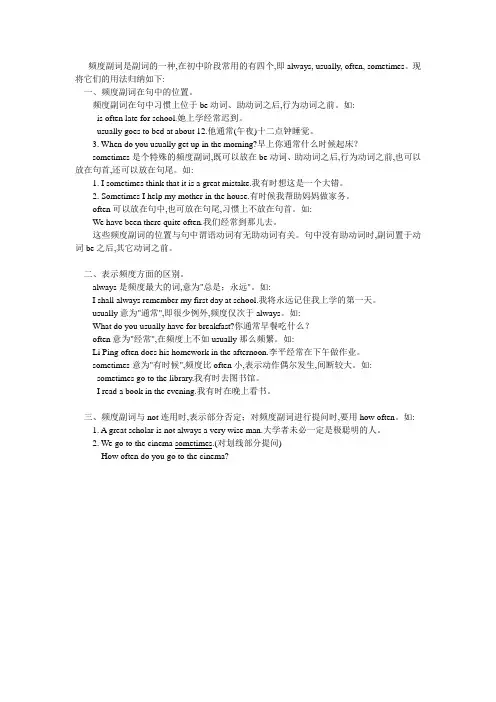
频度副词是副词的一种,在初中阶段常用的有四个,即always, usually, often, sometimes。
现将它们的用法归纳如下:一、频度副词在句中的位置。
频度副词在句中习惯上位于be动词、助动词之后,行为动词之前。
如:is often late for school.她上学经常迟到。
usually goes to bed at about 12.他通常(午夜)十二点钟睡觉。
3. When do you usually get up in the morning?早上你通常什么时候起床?sometimes是个特殊的频度副词,既可以放在be动词、助动词之后,行为动词之前,也可以放在句首,还可以放在句尾。
如:1. I sometimes think that it is a great mistake.我有时想这是一个大错。
2. Sometimes I help my mother in the house.有时候我帮助妈妈做家务。
often可以放在句中,也可放在句尾,习惯上不放在句首。
如:We have been there quite often.我们经常到那儿去。
这些频度副词的位置与句中谓语动词有无助动词有关。
句中没有助动词时,副词置于动词be之后,其它动词之前。
二、表示频度方面的区别。
always是频度最大的词,意为"总是;永远"。
如:I shall always remember my first day at school.我将永远记住我上学的第一天。
usually意为"通常",即很少例外,频度仅次于always。
如:What do you usually have for breakfast?你通常早餐吃什么?often意为"经常",在频度上不如usually那么频繁。
如:Li Ping often does his homework in the afternoon.李平经常在下午做作业。
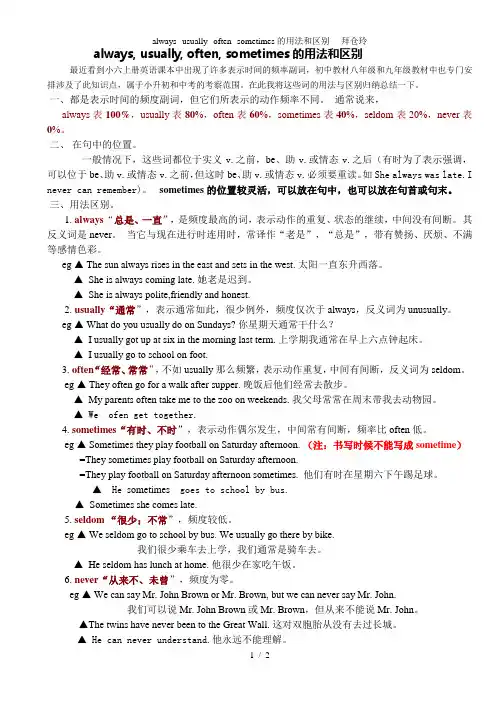
always, usually, often, sometimes的用法和区别最近看到小六上册英语课本中出现了许多表示时间的频率副词,初中教材八年级和九年级教材中也专门安排涉及了此知识点,属于小升初和中考的考察范围。
在此我将这些词的用法与区别归纳总结一下。
一、都是表示时间的频度副词,但它们所表示的动作频率不同。
通常说来,always表100%,usually表80%,often表60%,sometimes表40%,seldom表20%,never表0%。
二、在句中的位置。
一般情况下,这些词都位于实义v.之前,be、助v.或情态v.之后(有时为了表示强调,可以位于be、助v.或情态v.之前,但这时be、助v.或情态v.必须要重读。
如She always was late.I never can remember)。
sometimes的位置较灵活,可以放在句中,也可以放在句首或句末。
三、用法区别。
1. always “总是、一直”,是频度最高的词,表示动作的重复、状态的继续,中间没有间断。
其反义词是never。
当它与现在进行时连用时,常译作“老是”,“总是”,带有赞扬、厌烦、不满等感情色彩。
eg ▲ The sun always rises in the east and sets in the west. 太阳一直东升西落。
▲She is always coming late. 她老是迟到。
▲She is always polite,friendly and honest.2. usually“通常”,表示通常如此,很少例外,频度仅次于always,反义词为unusually。
eg ▲ What do you usually do on Sundays? 你星期天通常干什么?▲I usually got up at six in the morning last term. 上学期我通常在早上六点钟起床。
频度副词1.频度副词:表示动作发生间隔(既频率)的副词。
它们有:always ; usually ; often ; sometimes ;seldom ; hardly ever ; never 等。
2. how often意为“多久一次”,用来提问在某一段时间内进行某个动作的频率。
其回答通常是often、sometimes、never、hardly ever、always、once a day、once a week等等表示频率的副词或是短语。
例: --- She hardly ever watches TV. (划线提问)--- How often does she watch TV?例句理解:1. —What do you usually do on weekends?—I often go to the movies.2. —How often do you shop?—I shop once a week.3. — How often does she exercise?—She exercises every day.3.频度副词:表示频率不确定(1)不确定的频度副词always(100%)> usually(约80%~90%)> often(约60%)> sometimes(约30%)> seldom(约20%)> hardly ever(约10%)> never(0%)(2)表示确定的频率短语every day/week/month/year 每天/周/月/年 once a week 每周一次twice a week 每周两次 twice a month 一月两次three times a day 一天三次注:三次或三次以上一般用“基数词+times”表示。
(3)在句中位置:频度副词在句中通常放在be动词、助动词、情态动词之后,在实义动词之前。
例:She is often late for school.I can never be sure.He always helps me.课堂巩固练习:一、对划线部分提问1)He always plays basketball after school._______ does he always _______ after school?2) They hardly ever play football._______ _________ ________ they play football?二、单项选择( ) 1. ---How often ______ she exercise? ---Twice a week.A. doB. doesC. doingD. did( ) 2. I ______ like to drink milk.A. notB. doesn’tC. don’tD. no ( ) you go swimming ? ---Sometimes.A. How oftenB. How longC. how manyD.How old( )4. Katrina watches TV once ______ week.A. aB. theC. anD. ﹨知识扩展:1. how long多久(用来提问有多长时间)回答通常是more than two weeks、for a week、ten years等表示一段时间的状语。
频度副词(Adverbs of Frequency)一、频度副词是用来回答how often(经常与否,多久一次)这样问题的副词。
常用的频度副词有:always, almost always, usually, often, sometimes, hardly ever (seldom), never等。
这些频度副词在频度差异上可以这样表示:always (100%) > almost always>usually > often > sometimes > hardly ever (0%)always意为“总是”, 表示动作的重复或状态的延续。
usually意为“通常”, 表示很少有例外。
often意为“经常”, 表示动作的重复, 但不如usually那么频繁, 中间有间断。
sometimes意为“有时”, 表示动作偶尔发生。
hardly意为“几乎不”, 常和ever连用表示强调。
never意为“从未”。
二、频度副词通常放在动词前面,若句子里有情态动词、助动词或系动词be,则放在这类动词(第一个)的后面。
三、由wh- 和how 引导的特殊疑问句以及对应的答语。
如:What do/does +主语+频度副词+V.原+…?How often + 助动词do /does (或did) + 主语+ do sth.?What do you usually do on weekends?你通常周末做什么?I usually listen to music.我通常听音乐。
How often do you go to the factory?你多久去一次工厂?I go to the factory twice a week.我两周去一次。
How often do you exercise? 你(你们)多久锻炼一次身体?四、总结:how often“多久一次”询问动作的频率。
答语:(1)every+名词单数everymorning/afternoon/evening/day/Sunday/weekend/week/ month/term/year/…(2)次数+一段时间once a day / twice a week / once or twice a year / two or three times(3)频度副词always---usually---often=all the time=at times---sometimes---hardly ever---never =seldom。
常见频度副词的用法
1. “always”,哎呀呀,就像太阳总是每天升起一样,你看我总是喜欢吃巧克力呀!比如“I always eat chocolate when I'm stressed.”(我压力大的时候总是吃巧克力。
)
2. “usually”,嘿,这就好比你通常会在周末睡个懒觉一样,我通常晚上会看会儿书呢!像“She usually goes to the park on Sundays.”(她通常在周日去公园。
)
3. “often”,哇哦,就像他经常去打球,我也经常和朋友们聚会呀!比如说“I often have parties with my friends.”(我经常和朋友们聚会。
)
4. “sometimes”,哎呀呀,有时候就像天气会突然变化,我有时候也会偷懒不想做家务呢!例如“He sometimes forgets his keys.”(他有时候会忘记带钥匙。
)
5. “rarely”,咦,这就像看到流星那样罕见,我很少吃辣的东西呢!“I rarely eat spicy food.”
6. “never”,哇塞,这就如同永远不会有两片相同的雪花,我可从来不吃榴莲呀!“I never eat durian.”
7. “seldom”,呦呵,就好比中彩票那么难得,我真的很少去酒吧呢!“She seldom goes to the bar.”
8. “occasionally”,呀,偶尔就像天空中偶尔飘过的那片彩云,我偶尔会给自己放个假去旅游呀!“I occasionally take a vacation to travel.”
我的观点结论就是:这些频度副词真的很有用呀,能让我们的表达更加准确生动呢!。
常见频度副词频率大小常见频度副词按频率大小排列如下:编辑本段位置◆频度副词在句中习惯上位于系动词、助动词、情态动词之后,行为动词之前。
1. 在系动词之后。
如:She is sometimes very busy. 她有时很忙。
2. 在第一个助动词或情态动词之后。
如:I will never forget this lesson. 我将永远忘不了这一课。
3. 在实义动词之前。
如:We often go there. 我们常去那儿。
◆sometimes也可放在句首、句中或句末,often也可放在句末(一般不放在句首)。
如:Sometimes she writes to me. =She writes to me sometimes. 她有时候给我写信。
She writes to me often. 她经常给我写信。
◆如果有两个助动词,频度副词通常放在第一个助动词后面。
如:We have never been invited to one of their parties. 他们聚会,一次也没邀请过我们。
She must sometimes have wanted to run away. 她有时候一定想到过要逃走。
编辑本段用法◆always 频率最高,表示动作重复、状态继续,表示"一直、总是",其反义词为never。
always等与not连用时,表示部分否定。
如:The rich are not always happy. 有钱的人并不总是快乐的。
如果要变为否定句,应将always改为never才能全部否定。
如:Li Ping is always late for school. 李平上学总是迟到。
Li Ping is never late for school.(全部否定)Li Ping is not always late for school. (部分否定)频度副词通常和一般现在时连用,表示动作发生的频率。
关于always,usually , often ,sometimes 的区别always,usually , often ,sometimes这几个词语都是表示时间的频度副词,但它们所表示的动作频率不同。
通常说来,always表示100%,usually表示80%,often表示60%,sometimes表示40%,seldom表示20%,never表示0%。
1. always是频度最高的词,表示动作的重复,状态的继续,中间没有间断。
意为“总是、一直”,其反义词是never。
当它与现在进行时连用时,常译作“老是”,“总是”,带有赞扬、厌烦、不满等感情色彩。
eg ▲ The sun always rises in the east and sets in the west. 太阳一直东升西落。
▲ She is always coming late. 她老是迟到。
2. usually意为“通常”,表示通常如此,很少例外,频度仅次于always,反义词为unusually。
eg ▲ What do you usually do on Sundays? 你星期天通常干什么?▲ I usually got up at six in the morning last term.上学期我通常在早上六点钟起床。
3. often意为“经常、常常”,不如usually那么频繁,表示动作重复,中间有间断,反义词为seldom。
eg ▲ They often go for a walk after supper. 晚饭后他们经常去散步。
▲ My parents often take me to the zoo on weekends. 我父母常常在周末带我去动物园。
4. sometimes意为“有时、不时”,表示动作偶尔发生,中间常有间断,频率比often低。
eg ▲ Sometimes they play football on Saturday afternoon. =They sometimes play football on Saturday afternoon. =They play football on Saturday afternoon sometimes. 他们有时在星期六下午踢足球。
罕见频度副词频率大小之阿布丰王创作罕见频度副词按频率大小排列如下:always(100%)>usually(80%)>often(60%)>sometimes(40%) >seldom(20%)>hardly (5%)>rarely never(0%)折叠编辑本段位置◆频度副词在句中习惯上位于系动词、助动词、情态动词之后,行为动词之前。
1. 在系动词之后。
如:She is sometimes very busy. 她有时很忙。
2. 在第一个助动词或情态动词之后。
如:I will never forget this lesson. 我将永远忘不了这一课。
3. 在实义动词之前。
如:We often go there. 我们常去那儿。
◆sometimes也可放在句首、句中或句末,often也可放在句末(一般不放在句首)。
如:Sometimes she writes to me. =She writes to me sometimes. 她有时候给我写信。
She writes to me often. 她经常给我写信。
◆如果有两个助动词,频度副词通常放在第一个助动词后面。
如:We have never been invited to one of their parties. 他们聚会,一次也没邀请过我们。
She must sometimes have wanted to run away. 她有时候一定想到过要逃走。
折叠编辑本段用法◆always 频率最高,暗示动作重复、状态继续,暗示"一直、总是",其反义词为never。
always等与not连用时,暗示部分否定。
如:The rich are not always happy. 有钱的人其实不总是快乐的。
如果要变成否定句,应将always改为never才干全部否定。
如:Li Ping is always late for school. 李平上学总是迟到。